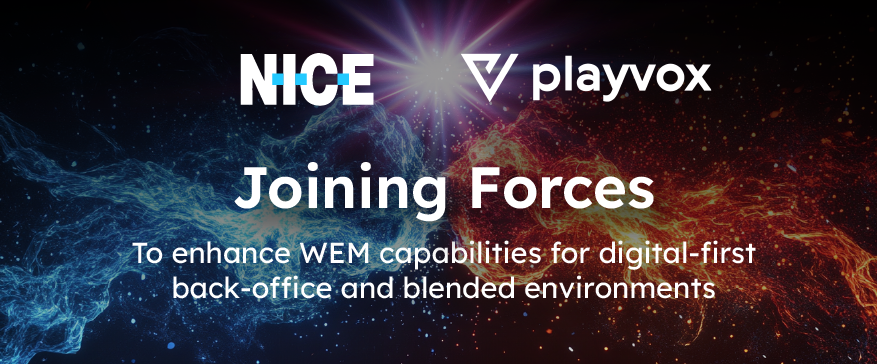Championing Diversity: Best Practices to Promote Inclusion and Belonging in the Workplace
In June, we proudly celebrate Pride Month where we walk alongside the LGBTQ+ community, commemorating and celebrating the advances in human rights issues that allow everyone to feel free and safe anywhere. Creating more spaces to learn about Diversity, Equity, Inclusion, and Belonging (DEIB) in the workplace is a constant task that involves us all, and educating about respect and human development continues to be a need in various organizations worldwide.
At Playvox, we reinforce how we should be proud of living openly and authentically. “We recognize the importance of inclusion and diversity both in and out of the workplace. Our Playvox community is honored and delighted to support diverse employees and their commitment to inclusion. Together, we celebrate our diverse and inclusive team of many cultures, nationalities, religious beliefs, gender identities, sexualities, generations, abilities, and ideas”, states Ismaily Piedra, VP of People at Playvox.
In this blog we explore some strategies adopted by companies from diverse industries, where employees are part of a new movement of inclusion and representation. The implementation of policies to address this matter significantly impacts companies, encouraging more spaces for communication, learning, and engagement, inspiring the way companies recruit or portray their brand, contributing to generating new models of thinking where plurality and innovation are enhanced.
A Holistic Approach
The 2024 EY US LGBTQ+ Workplace Barometer states that the LGBTQ+ community in the United States represents more than 15 million people. The report highlights the importance of promoting psychological safety, a sense of belonging, hiring more top talents, and promoting a more inclusive and diverse workforce. The study also highlights the importance of adopting a holistic vision that considers corporate social responsibility, how organizations offer support to their employees, more initiatives to promote the visibility and participation of the LGBTQ+ workforce, and the establishment of transparent and safe channels to report situations of discrimination or harassment.
At a regulatory and compliance level, guaranteeing the human rights of any community member is fundamental. In various countries, the debate around the fear of freely identifying oneself, the lack of access to benefits, or wage gaps continues to be recurring topics to progress in the workplace.
McKinsey’s 2023 Accelerating Sustainable and Inclusive Growth ESG Report presents a variety of sustainability actions, responsible practices, and inclusive growth initiatives that would inspire any contact center strategy. Among the initiatives they lead with their customers and employees, they have enabled a driving force with Employee Resource Groups, affinity groups, and marketing events to learn about the transgender experience, along with the launch of their Proud Speakers initiative, embracing storytelling in employee engagement.
In addition, The Corporate Equality Index 2023-2024 Workplace Report from The Human Rights Campaign Foundation, identifies various dimensions of how workplaces actively guarantee human rights for the LGBTQ+ workforce. The report is an excellent source for understanding crucial aspects such as supporting employees in their transition process, embracing self-disclosure, securing identity protection policies, or fundamental criteria companies should emphasize for championing LGBTQ+ inclusion.
A recent article from Harvard Business Review, Why Companies Must Recommit to the Fight for LGBTQ+ Rights, reflects on the importance of working towards implementing safe policies and practices, including preparing managers with training programs, structuring programs where allies can join the conversation, and how affinity groups or Employee Resource Groups for LGBTQ+ employees can make a difference.
How to Support LGBTQ+ Inclusive Workplaces
Inspired by Pride Month’s importance, we summarize trends that could inspire an inclusive culture for your contact center. Share these best practices with your team if you are looking for ideas on how to instill Diversity, Equity, Inclusion, and Belonging (DEIB) in your corporate culture and promote awareness and psychological safety for the LGBTQ+ workforce.
1. Establish Employee Resource Groups or Affinity Groups
Have you considered the impact of implementing more internal engagement events and activities where employees could collaborate around important topics to the LGBTQ+ workforce and share their own stories and struggles? Employee resource and affinity groups encourage spaces where authenticity, open dialogue, openness, and self-acceptance are enabled.
Suppose your organization encourages job fairs for the LGBTQ+ community or how attending a campus event could inspire younger students to apply for a tech career. Think of how an employee panel showcasing LGBTQ+ stories focusing on human rights, support, and guidance could benefit parents struggling with handling situations at home that might be affecting their children. A testimony shared in a roundtable could impact employees experiencing a deeper struggle related to their body image, gender identity, sexual orientation, or their own experience overcoming discrimination and career development. Different voices and perspectives also include allies who will stand along with mutual support and understanding, creating more spaces for the LGBTQ+ workforce to feel heard and understood.
How companies tell stories about their employees is a great alternative to humanizing brands and people’s experiences. By strengthening representation, various employees see themselves reflected in the stories of other collaborators. Beyond preferences, orientations, or choices, getting to know other people’s stories and how they lead their professional challenges is an excellent example of strengthening representativeness.
Talking about diverse topics also promotes psychological safety, a shared belief that people can express themselves freely in the workplace. An article published by BCG, Psychological Safety Levels the Playing Field for Employees, discusses the importance of cultivating empathy and how leaders play a fundamental role in how a team member feels supported. Identifying stories for meaningful conversations enables spaces that could profoundly impact, echoing how people feel comfortable discussing various topics related to the LGBTQ+ workforce or how a colleague feels supported in their self-acceptance journey.
2. Prepare Your People to Build an Authentic Workplace Culture
Have you considered how well-prepared your managers are to address workforce issues and how they can mitigate and prevent situations of discrimination in the workplace? This is where practicing active listening with your team and attending proper LGBTQ+ and unconscious bias training would help prepare your contact center leaders.
- Incorporating gamification strategies is a great alternative to bringing a multigenerational team together to educate on diversity, equity, and inclusion issues. Understanding LGBTQ+ terms and definitions could be challenging at first, and that is why establishing a training program with a rights-based approach, considering the profile of your employees, could be a great starting point for your contact center leaders.
- Think about how your training could contribute to eradicating bias, tackling assumptions and miscommunication, or how to handle situations where most of your employees don’t know how they should address the LGBTQ+ workforce, respecting their identity, gender, or preferences.
- Identifying associations and public-private alliances that can support your organizational strategies are also a great way to start. Non-profits, or global companies coalitions, such as Open For Business, Out &Equal , ILGA Europe, and GLAAD, lead initiatives to promote and raise awareness about the importance of fostering inclusion, belonging and equality in the workplace, helping companies identify a route map for their strategies.
- Attending human resources, human capital management, business and workplace forums and events focused on diversity matters and the LGBTQ+ workforce enables more networking opportunities and contributes to building a personal brand.
- A pride parade represents a great opportunity for allies and affinity groups to celebrate together and collaborate on a fun and creative project for your company. Design a great outfit to wear and join the next parade to show support for LGBTQ+ rights. Join the Pride Month celebration in Madrid, New York, Brazil, or your nearest city, walking proudly. Celebrate sharing common interests, where everyone is in tune with the meaning of supporting others, and most importantly, celebrate being who you are, enjoying the free development of your personality.
3. From Storytelling to Storydoing
During June, you might see more news pointing out critical issues related to the LGBTQ+ workforce worldwide. Social media has a proliferation of reports, studies, and posts dedicated to raising awareness about fundamental issues for the LGBTQ+ community. Take your time to read them and acknowledge how you could actively participate as a supporter. It is everybody’s business to continue advocating for human rights, and brands can also be a supportive channel to inspire and drive change.
It is essential to consider that celebrating Pride Month goes beyond raising the pride flag and creating variations of your company logo inspired by the colors of the rainbow. The real change lies in systems thinking and thought processes, increasing bias awareness, speaking out, and guaranteeing policies that support employees in constructing safe workplace cultures.
Pride Month is an invitation to inspire action. It is essential to evaluate the state of your Contact Center, diagnose aspects for improvement with your Customer Service Center employees, or assess action plans that have been carried out to raise awareness, cultivate spaces of respect and tolerance, and increase the sense of belonging, representation and career development of the LGBTQ+ workforce.
Many organizations worldwide are consistent with their business practices and organizational culture and have successfully structured their positioning around Diversity, Equity, Inclusion, and Belonging (DEIB) strategies. If you are an emerging or large company in the contact center space, consider inspiring from some of the following trends and best practices to engage your employees, customers, and stakeholders:
- Implement editorial and communication guidelines for job posts and content creation, along with guidelines for supplier and employee onboarding
- Establish internal policies and training programs for employees, considering individual contributors, managers and C-Level positions
- Implement internal influencer campaigns and encourage employees to engage in internal campaigns, to encourage representativeness or lead a series of talks, and interviews in blogs or corporate videos
- Create virtual and onsite fairs to encourage recruitment or assess and evaluate current recruitment processes
- Join Business and Networking Events that could help leverage your personal brand
- Celebrate joining Pride Events and fostering a celebration culture within the workplace
Ignite the innovation spark during Pride Month, commemorating advances for the LGBTQ+ workforce, and assess how your contact center defends human rights for all your employees. Considering diverse perspectives is suitable for your business; it will drive change, foster creativity and innovation, instill new ways of working, and build safe spaces that allow people to live authentically, which will always have a profound impact that transcends the workplace.
At Playvox, our solutions are designed to improve your agent and customer experiences. We discuss topics that are inherent to your team’s needs, and we know that these aspects are fundamental to enhancing the talent and human development of your contact center. Let’s design together the future of your organization, where we enhance the power of your people to create an unforgettable experience for your customers. Explore more here.







